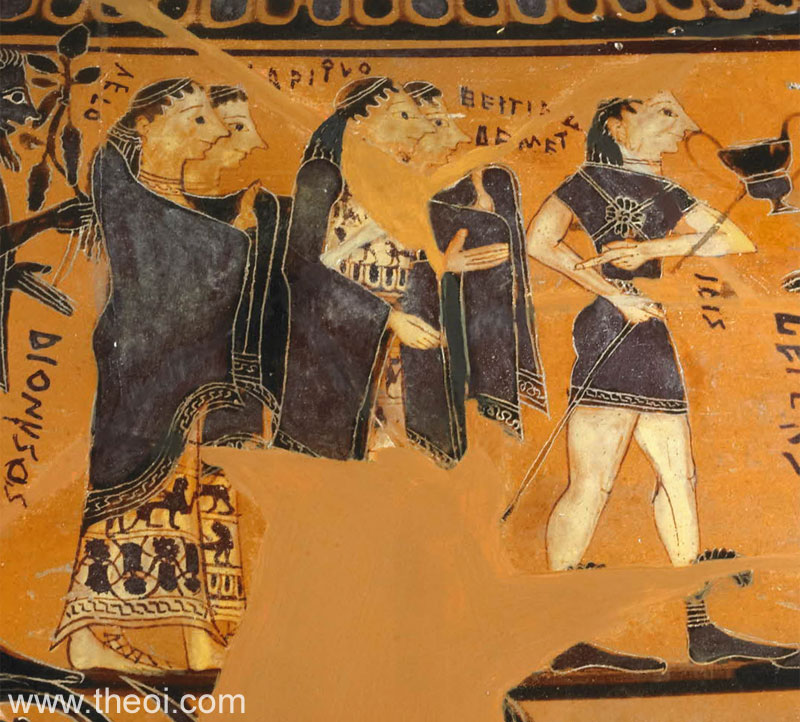KHARIKLO
Greek Name
Χαριχλω
Transliteration
Khariklô
Latin Spelling
Chariclo
Translation
Graceful Spinner

KHARIKLO (Chariclo) was a nymph of Mount Pelion in Magnesia (northern Greece) who was the wife of the wise centaur Kheiron (Chiron). She was the foster-mother of many of the great heroes of myth including Peleus, Akhilleus (Achilles), Aristaios (Aristaeus) and Asklepios (Asclepius).
Khariklo's name means "Graceful Spinner" from the Greek words kharis "grace" and klôsis "to spin". In the vase-painting (right) she accompanies Leto, mother of the god Apollon, in the wedding procession of Peleus and Thetis.
PARENTS
[1] APOLLON (Scholiast on Pindar's Pythian 4.181)
[2] PERSES (Scholiast on Pindar's Pythian 4.181)
[3] OKEANOS (Scholiast on Pindar's Pythian 4.181)
OFFSPRING
[1] NYMPHAI PELIONIDES (by Kheiron) (Pindar Pythian Ode 5)
[2] ENDEIS (by Skeiron) (Plutarch Theseus 10.3)
[3] OKYRHOE (by Kheiron) (Ovid Metamorphoses 2.636)
[4] KARYSTOS (by Kheiron) (Scholiast on Pindar's Pythian 4.181; Eustathius on Homer 281)
ENCYCLOPEDIA
CHA′RICLO (Chariklô). The wife of the centaur Cheiron, and mother of Carystus. She was a daughter of Apollo, and according to others of Perses or of Oceanus. (Schol. ad Pind. Pyth. iv. 181; Ov. Met. ii. 636.)
Source: Dictionary of Greek and Roman Biography and Mythology.
CLASSICAL LITERATURE QUOTES
Eumelus or Arctinus, Titanomachia Fragment 6 (from Scholiast on Apollonius Rhodius 1. 554) (Greek epic C8th B.C.) :
"Kheiron (Chiron) was born a kentauros (centaur) : his wife was Khariklo (Chariclo)."
Pindar, Nemean Ode 4. 101 ff (trans. Conway) (Greek lyric C5th B.C.) :
"[The Argonaut Iason (Jason)] answered him thus : ‘Kheiron (Chiron) my teacher was, this shall I prove. From Khariklo (Chariclo), I say, and Philyra's cave I come, where the chaste daughters of the Kentauros (Centaur) nursed my young days. Through all my twenty years I gave them no rough word or hasty deed . . .
For they [Jason's parents], when first I saw the light, fearing that leader's overweening and cruel pride, laid forth within the house dark robes of mourning, as though their babe were dead; and amidst wailing women sent me forth secretly, wrapped in purple swaddling clothes, that only the dark of night might know my path, and gave me to Kheiron, Kronos' (Cronus') son, to be my guardian.’"
Apollonius Rhodius, Argonautica 1. 551 ff (trans. Rieu) (Greek epic C3rd B.C.) :
"Kheiron (Chiron) son of Philyra came down from the high ground [of Mount Pelion] to the sea and wading out into the grey surf waved his great hand again and again and wished the travellers [i.e. the departing Argonauts] a happy home-coming. His wife [i.e. Khariklo (Chariclo)] came too. She was carrying Peleus' little boy Akhilleus (Achilles) on her arm, and she held him up for his dear father to see."
Plutarch, Life of Theseus 10. 3 (trans. Perrin) (Greek historian C1st to C2nd A.D.) :
"Aiakos (Aeacus), and grandfather of Peleus and Telamon, who were the sons of Endeis, daughter of Skeiron (Skiron) and Khariklo (Chariclo)." [N.B. Plutarch replaces Kheiron with Skeiron, king of the island of Skyros. This is a late Greek rationalisation of the myth in which fantastical creatures like the centaur are dispensed with.]
Ovid, Metamorphoses 2. 636 ff (trans. Melville) (Roman epic C1st B.C. to C1st A.D.) :
"One day the Centaurus' [Chiron's] daughter came, her auburn hair falling upon her shoulders, whom the Nympha Chariclo once had borne upon the bank beside a flowing river, and had named Ocyroe (Swift-Flowing)."
SOURCES
GREEK
- Epic Cycle, Titanomachia Fragments - Greek Epic C8th B.C.
- Pindar, Odes - Greek Lyric C5th B.C.
- Apollonius Rhodius, The Argonautica - Greek Epic C3rd B.C.
- Plutarch, Lives - Greek Historian C1st - 2nd A.D.
ROMAN
- Ovid, Metamorphoses - Latin Epic C1st B.C. - C1st A.D.
OTHER SOURCES
Other references not currently quoted here: Eustathius on Homer's Iliad 281, Scholiast on Pindar's Pythian 4.181.
BIBLIOGRAPHY
A complete bibliography of the translations quoted on this page.